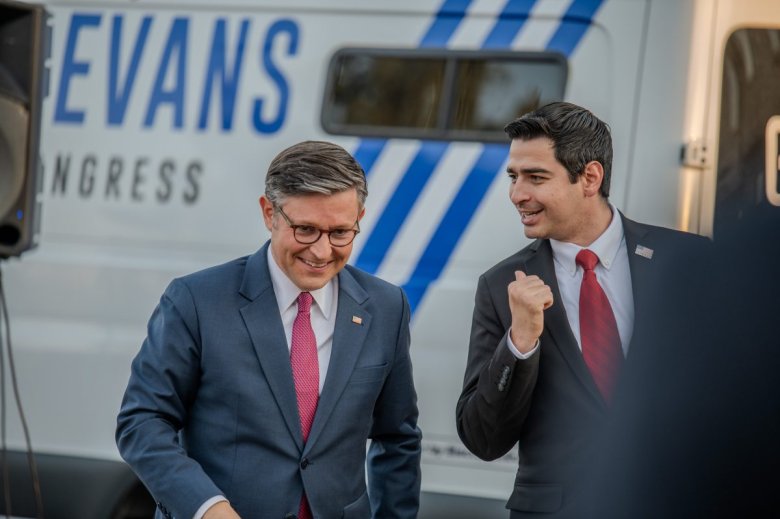Nearly $15 million in super PAC cash has poured into the race in Colorado’s highly competitive 8th Congressional District, and the money keeps rolling in with less than a month until Election Day.Â
Paired with candidate spending, the price tag for the contest has now well surpassed $20 million.
Democratic super PACs reported spending $8.4 million in the 8th District through Friday to help U.S. Rep. Yadira Caraveo, the Democratic incumbent from Thornton. Republican super PACs spent nearly $6.3 million through Friday to benefit Republican state Rep. Gabe Evans of Fort Lupton.
Those amounts don’t account for millions more in reserved TV ad time that has yet to be reported to the Federal Election Commision.Â
The stakes in the toss-up 8th District, which spans Denver’s northeastern suburbs along U.S. 85 into Greeley, are high. The outcome of the race between Caraveo and Evans may decide which party controls Congress. Caraveo beat her Republican opponent in 2022 by roughly 1,600 votes, a race in which PACs spent $16.6 million in the general election.
“Colorado eight: You are going to decide who has the majority in the Congress going forward,” House Speaker Mike Johnson, the top Republican in Congress, said at a rally in Thornton earlier this month. “When you talk about the most important races in America, this is, indeed, a top five race.”
Super PACs can raise and spend unlimited amounts of money, though they are prohibited from coordinating with candidates.
The Congressional Leadership Fund, a super PAC tied to Johnson, has been the biggest PAC spender in the 8th District so far, at nearly $3.4 million to help Evans.Â
The second biggest spender so far has been Fairshake, at $2 million to help Caraveo. The political action committee backs candidates who are open to the cryptocurrency economy. The Democratic Congressional Campaign Committee is in a close third, having spent $1.9 million to aid Caraveo.
Another political action committee spending big in the 8th District is the Mainstream Colorado Fund. Nearly all of its nearly $1 million in funding has come from nonprofits that don’t disclose their donors, which The Colorado Sun refers to as dark money groups, including $50,000 from a group called Mainstream Colorado Action, which formed in July. It is registered to the Tierney Lawrence Stiles law firm in Denver, which represents Democratic candidates and causes.Â
The Mainstream Colorado Fund has also received $560,000 from the Sixteen Thirty Fund, a Democratic dark money group based in Washington, D.C. The PAC has received $250,000 from America Votes, another D.C. dark money nonprofit, as well as $100,000 from the House Majority PAC, a Democratic group tied to House Minority Leader Hakeem Jeffries, D-New York.
The super PAC spending in the district, both on the Democratic and Republican sides, has gone toward flooding the TV airwaves with ads, as well as streaming and internet advertising and canvassing.
Caraveo and Evans are also raising and spending large amounts through their campaigns, with Caraveo leading in both categories.Â
She raised $2.2 million in July, August and September, spending $3.3 million during that period and starting October with $2.35 million in the bank. The majority of her spending was on advertising, though she also spent about $85,000 on polling and $70,000 paying her campaign staff.Â
Caraveo’s notable donors during the quarter included the American Israel Public Affairs Committee, or AIPAC; JSTREETPAC; Margaret Gupta, cofounder and chief operating officer of the information technology firm Apex CoVantage; Joseph Gleberman, CEO of the Pritzker Organization; and Ken Seiff, general partner of Blockchange Ventures, a venture capital firm.
Evans raised nearly $1 million from July 1 to Sept. 31 and spent about $700,000 during that period. He began October with roughly $825,000 in the bank. The campaign spent $366,000 on ads and ad production during the quarter, including spots on TV, streaming services, the internet and radio.Â
The Republican’s campaign paid about $14,000 in July and August to Jessica Spindle, who served as Evans’ political director until he fired her upon learning from a liberal news outlet that she had made posts on social media that were antisemitic and supported conspiracies and political violence.
Evans also reported paying himself $4,950 after taking a monthly salary of $1,650. There’s nothing illegal about the payments, but it’s unusual for candidates to pay themselves or their loved ones a salary because of the criticism it can draw.Â
 House Speaker Mike Johnson, R-Louisiana, talks with state Rep. Gabe Evans after a rally in Thornton on Sunday, Oct. 6, 2024. (Jesse Paul, The Colorado Sun)
House Speaker Mike Johnson, R-Louisiana, talks with state Rep. Gabe Evans after a rally in Thornton on Sunday, Oct. 6, 2024. (Jesse Paul, The Colorado Sun)
The notable donors to Evans’ campaign last quarter included businessman Ross Perot Jr. and his wife, Sarah; Jeffery Hildebrand, founder and CEO of Hilcorp Energy Company, and his wife, Melinda; Frederick Smith, the founder and chairman of FedEx; Larry Mizel, a Republican megadonor and Israel booster who lives in Denver and is founder and executive chairman of MDC Holdings, a home construction company headquartered in Denver; and Steve Wells, a wealthy rancher and oil and gas booster who lives in Weld County.
There is only one more federal campaign finance reporting deadline before the Nov. 5 election. That will cover fundraising and spending by candidates and PACs between Oct. 1 and Oct. 16. Some spending by PACs must also be reported more often between now and Election Day.Â
Adam Frisch maintains his cash advantage in the 3rd Congressional District
 Democrat Adam Frisch, left, and Republican Jeff Hurd, candidates for U.S. House of Representatives for Colorado District 3, shake hands during a candidate forum in Montrose Colo., Wednesday morning, October 9, 2024. (William Woody)
Democrat Adam Frisch, left, and Republican Jeff Hurd, candidates for U.S. House of Representatives for Colorado District 3, shake hands during a candidate forum in Montrose Colo., Wednesday morning, October 9, 2024. (William Woody)
The 3rd Congressional District, which spans the Western Slope into Pueblo and southeastern Colorado, is likely to be the state’s second most competitive congressional district this year. Former Aspen City Councilman Adam Frisch, a Democrat, is running against Grand Junction attorney Jeff Hurd, a Republican, in the contest.Â
Super PAC spending in the Republican-leaning district has been a fraction of what has been spent in the 8th District.Â
Republican super PACs, led by Americans for Prosperity Action, have reported spending $695,000 to support Hurd, while Welcome PAC has spent $122,000 to support Frisch and is the only group that has reported spending to support him in the general election thus far.
Frisch raised $2.2 million in the third quarter of the year, spending nearly $4.2 million, mostly on advertising. He still had $2 million in cash at the end of September.
Hurd raised more than $1 million in the third quarter of the year, spending nearly $489,000, mostly on advertising and consulting. He had $706,000 in campaign cash on hand at the end of September. About one-fourth of Hurd’s fundraising came from PACs representing business and political interests.
Frisch frequently attacks Hurd for taking so-called corporate PAC money, like donations from Home Depot, the National Automobile Dealers Association and the US Energy PAC. But Hurd has pointed out that some of the partisan PACs Frisch has received money from are funded by corporations.
For instance, Frisch’s campaign received $2,500 in June and another $5,000 in September from the Blue Dog PAC. That committee has received donations from many corporations, including the pharmaceutical companies Genentech, Boehringer Ingelheim and Eli Lilly and Company. Donors to Blue Dog PAC also include the National Venture Capital Association, the American Financial Services Association and the Synchrony Financial Employees PAC.
Bridge the Gap PAC, which gave Frisch’s campaign $1,000 in June, has received donations from Home Depot, UnitedHealth Group and investment giant BlackRock.
Hurd said Frisch’s criticism was like claiming he’s not eating Taco Bell because he received the fast food via Uber Eats instead of directly from the restaurant.
Frisch was asked during a recent debate if he had been taking money through go-betweens.Â
“Only one of us takes corporate PAC money,” Frisch replied, not answering the question.
Trisha Calvarese vastly outraised Lauren Boebert, but national PACs remain on the sidelines
In the 4th Congressional District, Republican U.S. Rep. Lauren Boebert was vastly outraised last quarter by her Democratic challenger Trisha Calvarese.Â
Calvarese reported raising about $2.7 million in July, August and September, spending $1.5 million during that period and starting October with about $1.3 million in cash. Her biggest expense during the quarter, $1.1 million, was advertising.Â
She ran one TV ad in which she talked about her experience providing end-of-life care to her parents. “We can’t let Lauren Boebert’s cruelty win here,” Calvarese says in the 30-second spot.
Another ad run by Calvarese featured Danielle Robinson, whose husband, Keith, a military veteran who deployed to Iraq, died from lung cancer in 2020. Robinson blasts Boebert in the ad for voting against the PACT Act, which expands benefits for veterans who were exposed to toxic burn pits.
“She even heckled when Keith was honored at the State of the Union,” Robinson says. “My family deserved better. So did the veterans she voted against.”
In a statement to The Colorado Sun, Boebert explained her decision to vote against the measure: “There was no funding mechanism for this gigantic investment, and, even worse, this bill lacked a plan for staffing resources to handle the increase in cases which has led to an even further backlog of cases. This tragically hurts all veterans. Just last month, the VA Department had to be bailed out because of shoddy management and unrealistic promises from politicians.”Â
The 4th District, which stretches across the Eastern Plains into Douglas County and Loveland, is considered a Republican stronghold. But Calvarese has parlayed Boebert’s national unpopularity among Democrats into a major fundraising juggernaut powered by donors giving smaller amounts.
Boebert, by comparison, raised $532,000 during the quarter, spending $513,000 and ending September with $549,000 in campaign cash. Much of her spending went toward advertising and consulting.Â
Boebert has been running two TV ads: one touting her work for veterans and the other boasting about her positions on the economy, oil and gas and women’s sports, specifically her opposition to transgender people competing in them.
Nevertheless, no super PACs are spending on the contest in an indication that national Democrats and Republicans think Boebert is likely to win the race.Â
Colorado four other congressional districts
 The U.S. Capitol. (Photo by Adam Michael Szuscik, via Unsplash)
The U.S. Capitol. (Photo by Adam Michael Szuscik, via Unsplash)
The races in Colorado’s 1st, 2nd, 5th, 6th and 7th Congressional districts aren’t considered competitive. Still, here are some highlights from the fundraising and spending in those races:Â
In the Republican-stronghold 5th Congressional District, Democrat River Gassen raised $78,000 and spent $60,000 during the quarter, ending September with $22,000 in cash on hand, a relatively paltry amount. Among her spending during the reporting period was $3,900 on a used 2006 Subaru Outback with 135,000 miles that she purchased to use as a campaign vehicle. Republican Jeff Crank raised $270,000 and spent about $116,000, ending the month with $275,000 in the bank. He’s been advertising on Colorado Springs TV stations.
Democratic U.S. Rep. Jason Crow of Centennial raised $320,000 during the quarter and had $1.8 million in cash on hand to end September. Republican John Fabbricatore, his longshot opponent, raised $141,000 and has $82,000 in the bank to start this month.
In the Democratic-leaning 7th Congressional District, Democratic U.S. Rep. Brittany Pettersen of Lakewood reported raising $390,000 during the quarter and headed into October with $1 million in cash on hand. Her Republican opponent, Sergei Matveyuk, raised less than $20,000 during the quarter and had about $19,000 in cash to start October.
Colorado Sun correspondent Sandra Fish contributed to this report.
Type of Story: News
Based on facts, either observed and verified directly by the reporter, or reported and verified from knowledgeable sources.
Source link : http://www.bing.com/news/apiclick.aspx?ref=FexRss&aid=&tid=670fe27afb824b17bdc259612b1af6aa&url=https%3A%2F%2Fcoloradosun.com%2F2024%2F10%2F16%2Fcolorado-8th-congressional-district-spending-2024-election%2F&c=13495354968264973540&mkt=en-us
Author :
Publish date : 2024-10-16 04:03:00
Copyright for syndicated content belongs to the linked Source.












